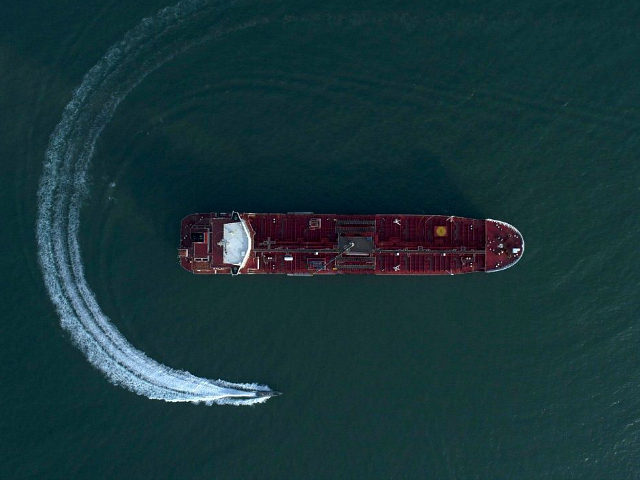Iran in recent days captured the third foreign tanker in the Persian Gulf in less than a month amid intensifying tensions with the United States, Iranian state media reported over the weekend.
On July 31, the Islamic Revolutionary Guard Corps (IRGC) seized the foreign tanker for allegedly “smuggling 700,000 liters of fuel from Iran” to Sunni Gulf Arab states, the state-run Fars News Agency (FNA) reported Sunday.
IRGC “impounded a foreign vessel near the Farsi Island in the Persian Gulf,” the news outlet added.
The state-owned Islamic Republic News Agency (IRNA) also found that IRGC troops arrested all of the foreign crew members. The detainees’ nationalities remain unknown despite IRNA reporting, cited by the New York Times (NYT) that the seized ship is from Iraq.
“The oil tanker that was captured on Wednesday for smuggling Iran’s fuel to other countries was an Iraqi ship,” IRNA said, quoting the IRGC.
Iraq claims that a private entity owns the ship. Baghdad stresses that it has “no connection to the seized vessel and that it is working to gather information about it,” BBC reported Monday.
Shiite Iran and Iraq are close allies. Iran maintains a substantial influence over Iraq.
The IRGC is “always ready and will spare no efforts to defend the national interest of Iran,” the force said, according to Fars News.
Both Fars and IRNA conceded that the Iranian forces had seized other foreign vessels in recent weeks.
Claiming it was violating international law, armed IRGC personnel seized the British Stena Impero tanker on July 19 without harming any of the crew.
On July 14, the IRGC announced it had detained the Panamanian-flagged ship Riah, based in the United Arab Emirates (UAE), for allegedly carrying about one million liters of contraband fuel.
The UAE — a close ally to Iran’s mortal enemy Sunni Saudi Arabia — proclaimed that no entity within it borders owns to the seized ship.
Notwithstanding the recent seizures, the U.S. has blamed state-sponsor of terrorism Iran of two separate attacks on oil tankers in the Gulf of Oman in May and June. Tehran refutes the accusations.
Iran also shot down an American drone over the Strait of Hormuz on June 20. The move brought the United States close to attacking Iran, but Trump called it off over the potential casualties in the Islamic Republic.
On July 18, the U.S. said it also downed an Iranian drone that flew to close to an American warship in the Strait of Hormuz.
The U.S. “took defensive action” against an unmanned aerial vehicle (UAV) that had “closed into a very, very near distance, approximately 1,000 yards,” Trump declared.
The drone was “threatening safety of the ship and the ship’s crew” and “was immediately destroyed,” the commander-in-chief added.
Iran denied losing any drones after the attack.
In the wake of the recent incidents and U.S-Iran naval confrontations simmering for years, the Trump administration has intensified patrols in the Persian Gulf. President Trump has approved more troop deployments (an additional 2,500 since May) and other military assets (the aircraft carriers Abraham Lincoln).
U.S. Secretary of State Mike Pompeo traveled to the Middle East in June to build an international coalition against Iran.
In recent days, the Trump administration asked South Korea, Japan, France, Germany, Australia, and others to join an initiative in the Strait of Hormuz to protect ships from Iran aggression.
Iran is lashing out over an unprecedented wave of economic sanctions imposed by the Trump administration. The penalties include the restrictions reimposed after U.S. officials suspended them under the controversial 2015 nuclear deal between Tehran and U.S.-led world powers.
U.S. sanctions are crippling the Iranian economy, hindering the Islamic Republic’s ability to fund its terrorist proxies like Hezbollah and the IRGC. However, Iran may receive economic relief if China and India decide to continue ignoring U.S. sanctions on Iranian oil purchases.
There have been some recent military confrontations between the Iranian and American forces in the Middle East, leading to the downing of two drones from each country.
U.S.-Iran tensions impacted international trade and promoted friction in the Strait of Hormuz located between the Persian Gulf and the Gulf of Oman.
The strait is considered one of the world’s most strategically important locations for international trade — at least 25 percent of total global oil consumption sails through there.
U.S. sanctions have made it nearly impossible for other countries to purchase crude from the Islamic Republic.
In response, Iran has threatened to blockade the Persian Gulf and ensure “no oil” is exported through the region until the U.S. suspends the restrictions.
Iran claims that the United States is unable to cut off its oil revenues completely. Despite the U.S. sanctions, China and India continue to purchase Iranian oil, NYT reported Sunday. India is Iran’s second-biggest oil customer after China.
Other ongoing buyers of Iranian oil are also NATO member Turkey and war-ravaged Syria, where Tehran maintains a presence in support of dictator Bashar al-Assad.

COMMENTS
Please let us know if you're having issues with commenting.